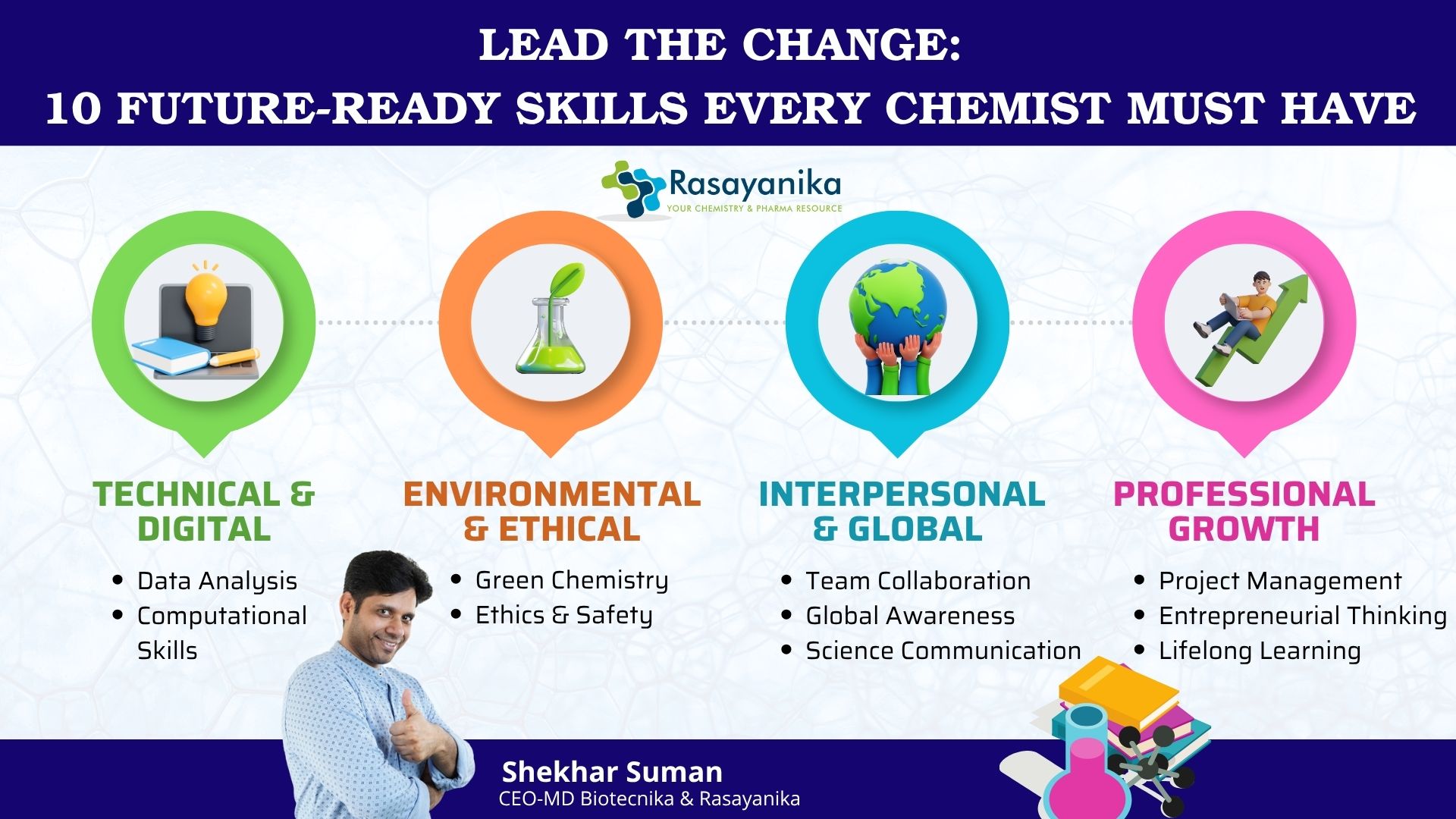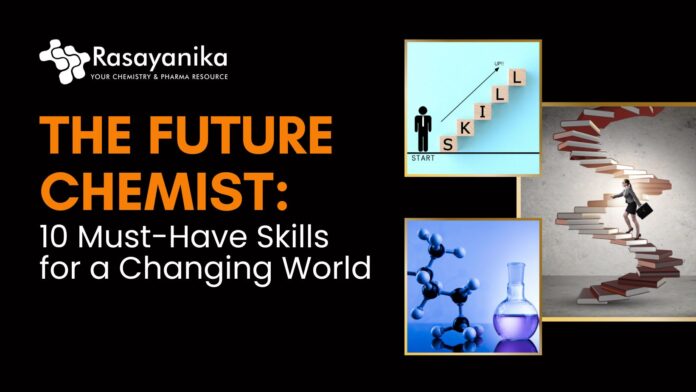Top Skills Chemistry Graduates Need Beyond the Laboratory in 2025
Well, it all began with a spontaneous moment in a School’s Chemistry laboratory, where a curious and Chemistry-enthusiastic student watched an acid-base reaction with colourful fizz. That small Chemical experiment filled the students with wondering thoughts and planted an intriguing seed of lifelong fascination for Chemistry. For many Chemistry enthusiasts and professionals, it’s these small and magical Chemical moments that spark a passion for understanding the material world of Chemistry.
As the passion grows, guided by textbooks, hands-on experiments, as well as mentorship, a new understanding of Chemistry takes shape. Chemistry is no longer confined to test tubes, Bunsen burners, and beakers. Today, the role of a Chemist has evolved tremendously, and Chemistry graduates are stepping into an advanced era, expected to be global collaborators, Ethical thinkers, and data innovators.
So, what basic Chemistry skills and experience does it take to thrive in this ever-changing and dynamic field of Chemistry? This article underlines the ten essential skills that go beyond the laboratory bench. These are the skill sets that every Chemist should know to navigate and lead in the future of science. These skills are not only beneficial but also crucial for your success.
Even though conventional laboratory skill sets remain fundamental, the Chemistry industry now demands much more than the traditional concepts. Chemistry graduates are expected to be digital natives, critical thinkers, heroes of sustainability, as well as effective communicators. From Green Chemistry reshaping the future of manufacturing to AI transforming Drug Discovery, Chemistry graduate skills must now go beyond basic Chemistry skills to encompass Technical innovation and interdisciplinary agility.
These 10 essential Chemistry graduate skills are shaping the future of science beyond traditional labs.
01 Digital Literacy and Data Analysis
In today’s Scientific horizon, Digital proficiency is becoming a necessity beyond basic Chemistry skills, as Chemists are now interpreting vast datasets, from Analytical reports to Computational outputs. Chemists are now interpreting vast amounts of datasets, from Analytical reports to Computational outputs, and Spectroscopy results. Understanding data collection tools, analytical methods, and visualization platforms is a skill that’s becoming increasingly indispensable in the field of Chemistry.
- Why It Matters: Modern Chemistry is driven by datasets, from Computational simulations to Analytical instrumentation. A good Chemist should be able to utilize digital tools, critically interpret results, and navigate large datasets effectively.
- What to Learn:
- Data visualization with Power BI, Tableau, or GraphPad Prism
- ELNs (Electronic Lab Notebooks) and LIMS (Laboratory Information Management Systems)
- Python, R, or Microsoft Excel for statistical analysis
- Career Insight: Data-proficient Chemists are not just assets; they are pioneers in materials R&D (Research & Development), Process Optimization, and Pharmaceutical Analytics roles. The skills stated would open new career paths for Chemists into Research strategy as well as Data Science roles.
02 Coding and Computational Chemistry
In this modern era, Chemists utilize the knowledge of Chemistry and Computer Science to automate workflows, use AI to predict Chemical behavior, and run Molecular simulations. Coding knowledge is becoming a necessity and a preference for Chemists who have a zeal to contribute to the development of Software Tools as well as stay competitive in Chemistry Research careers.
- Why It Matters:
- Computational Tools and AI are transforming drug design, reaction optimization, as well as Molecular Modeling.
- What to Learn:
- AI and ML (Machine Learning) libraries such as scikit-learn and TensorFlow
- AutoDock, Gaussian, Schrödinger Suite, and ChemDraw for Modeling
- Julia, MATLAB, and Python for Data handling and scripting
- Career Insight:
- Chemists possessing the knowledge of Computational Tools are in high demand in the Fields of AI-assisted drug design, virtual screening programs, as well as Cheminformatics.
03 Green Chemistry and Sustainability
As industries worldwide strive to meet environmental and ESG (Environmental, Social, and Governance) targets, Green Chemistry has shifted from a niche interest to a mainstream priority. Chemists are expected to develop Green solutions that are Scientifically sound, environmentally responsible, efficient, as well as safe, reflecting the importance of sustainability in the field.
- Why It Matters:
- According to Grand View Research, by the year 2030, the Global Green Chemicals market is expected to reach $160 billion. Governments and corporations are working towards reducing carbon emissions, the use of hazardous materials, as well as wastage.
- What to Learn:
- LCA Life Cycle Assessment) and Circular Economy concepts
- Renewable solvents, energy-efficient synthesis, and Biodegradable polymers
- The 12 Principles of Green Chemistry: understanding
- Career Insight:
- Chemists with expertise in Green Chemistry can advance their careers in various domains, including sustainable product development, climate tech, environmental compliance, and clean energy innovation.
04 Ethics, Safety, and Regulatory Knowledge
With Chemical Research impacting the environment and lives, safety, Ethics, and strong basic Chemistry skills are more than checkboxes; they are foundational responsibilities.
- Why It Matters:
- Issues in Ethics or safety can lead to severe hazardous consequences, including reputational damage and Legal actions. Compliance with regulations is essential across various industries. Regulatory Compliance and Ethical decision-making protect both people and our Earth.
- What to Learn:
- Data Ethics and Research Integrity
- PPE, Chemical hygiene, MSDS, and waste disposal
- FDA (Food and Drug Administration) guidelines, GMP (Good Manufacturing Practices), REACH (Registration, Evaluation, Authorisation and Restriction of Chemicals), and GLP (Good Laboratory Practices)
- Career Insight:
- Professionals with regulatory acumen are in demand in Clinical Research, QA (Quality Assurance), Pharmaceutical compliance, and QC (Quality Control).
05 Interdisciplinary Collaboration
Advancements in Bioengineering, nanotechnology, and materials depend on collaborative efforts across multiple disciplines in various sectors. Successful Chemists are now team players who can speak the language of Physics, Computer Science, and Biology.
- Why It Matters:
- A Nature study highlighted that interdisciplinary Research articles are cited up to 50% more than single-discipline papers. This emphasized the value of cross-field collaboration across different disciplines. Today, Chemistry merges with Physics, Biology, Engineering, and AI, making cross-functional teamwork an essential part of innovation and advancements.
- What to Learn:
- Soft skills for shared problem-solving and professional communication
- Team collaboration tools, such as Asana, Google Workspace, and Slack
- Basic knowledge of subjects like Fluid Dynamics, Materials Science, or Molecular Biology
- Career Insight:
- Top Employers prefer Chemistry candidates who demonstrate strong Chemistry graduate skills, such as adaptability and cross-disciplinary teamwork. This is especially important in fields including Biomaterials, Nanomedicine, and Synthetic Biology.

06 Global Perspective and Cultural Intelligence
Chemistry professionals today play a crucial role in addressing global challenges and collaborate in multinational teams. Understanding cultural norms and global Science trends enhances leadership and teamwork.
- Why It Matters:
- UNESCO (United Nations Educational, Scientific and Cultural Organization) reports that more than 30% of Researchers work outside their country of birth. Chemistry is becoming a global enterprise, as conferences, companies, and collaborations operate across borders around the world. A global mindset helps Chemists thrive in diverse environments.
- What to Learn:
- International Scientific practices and standards
- Cross-cultural etiquette and communication
- Trends in global Research and funding
- Career Insight:
- Chemistry Graduates with cultural fluency thrive in academic exchange programs, international NGOs (Non-governmental Organizations), and global corporations.
07 Science Communication and Writing
The ability to share Scientific work effectively and clearly can set a Chemist apart from the rest. Whether delivering a presentation, speaking to the public, or writing a grant, strong communication magnifies Scientific impact.
- Why It Matters:
- Among the most vital Chemistry graduate skills, communication enhances visibility, funding success, and public trust. Effective communication fosters cross-sector influence, enhances visibility, as well as increases funding success.
- What to Learn:
- Visual presentation, such as slide decks, infographics, and data storytelling
- Public engagement with the help of podcasts, outreach events, or blogs
- Scientific writing, such as papers, patents, and abstracts
- Career Insight:
- Chemists with strong communication skills are appropriate for roles in Science journalism, RA (Regulatory Affairs, technical marketing, and public policy.
08 Project Management and Organization
Beyond laboratory bench skill sets, Chemists should be able to manage budgets, team resources, as well as projects. In both Industry and Academia, being results-driven and organized helps translate Research studies into impact for a better future.
- Why It Matters:
- Effective project management enhances reproducibility, ensures compliance with protocols and deadlines, and minimizes expenditures.
- What to Learn:
- Time management strategies such as the Agile methodologies or the Eisenhower Matrix
- Writing SOPs (Standard Operating Procedures)
- Project management tools such as Monday.com, Notion, or Trello
- Career Insight:
- Chemists with strong Organizational skills often transition into career roles, including PI (Principal Investigators), R&D (Research & Development) coordinators, and Laboratory managers.
09 Innovation and Entrepreneurial Thinking
Chemists with an entrepreneurial mindset build upon their basic Chemistry skills to drive change in Diagnostics, materials, Agri-Tech, and Environmental Science. They understand both the science and the market.
- Why It Matters:
- Startup ecosystems in the chemical sciences are growing. For instance, Y Combinator and IndieBio now support dozens of Chemistry-focused ventures annually.
- What to Learn:
- Market Research and user-centric innovation
- Understanding patents, licensing, and funding sources
- Basics of product development and validation
- Career Insight:
- Many Chemistry graduates are becoming founders or innovators in venture-backed startups or as intrapreneurs within larger R&D teams.
10 Lifelong Learning and Adaptability
With constant advancements in AI, Quantum Chemistry, and Synthetic Biology, staying current is not optional. Lifelong learners lead the way.
- Why It Matters:
- According to LinkedIn Learning, adaptability and continuous learning are among the top 5 skills employers value most in 2025.
- What to Learn:
- Embracing resilience and curiosity in the face of change
- Attending webinars, virtual labs, and MOOCs
- Online platforms such as LinkedIn Learning and BioTecNika
- Career Insight:
- Chemists who continually learn and acquire knowledge are the first to adopt new technologies and often lead innovation.
Summary Table: Top Chemistry Graduate Skills Beyond the Laboratory in 2025
| Skill Area | Importance in 2025 |
| Digital Literacy & Data Analysis | Core for Research efficiency and decision-making |
| Green Chemistry & Sustainability | Vital for eco-conscious innovation |
| Coding & Computational Tools | Key for modern simulations and AI integration |
| Interdisciplinary Collaboration | Essential for solving real-world, cross-cutting problems |
| Ethics & Regulatory Compliance | Ensures safe, responsible, and lawful scientific work |
| Global Perspective | Prepares for multinational and multicultural workspaces |
| Project Management | Important for laboratory efficiency and leadership roles |
| Science Communication | Crucial for outreach, publications, and public trust |
| Lifelong Learning & Adaptability | Necessary for staying relevant and future-ready |
| Innovation & Entrepreneurship | Needed for creating solutions and business value |
Future Outlook For Chemists
The future of Chemistry is ethically driven, globally relevant, and digitally integrated. As technologies such as Quantum Computing, Synthetic Biology, and AI mature, the Chemistry field will intersect with materials, Medicine, Policy, and Climate Science.
By the year 2030, new career roles are expected to emerge, including Climate Chemists, Molecular Data Analysts, and AI-driven Chemists, offering exciting pathways for graduates. Chemists will play a crucial role in addressing global challenges such as antimicrobial resistance, climate change, and plastic pollution.
Your degree in Chemistry and your basic Chemistry skills are your launchpad, not your destination. In 2025, the Chemists who succeed are those who combine fundamentals with curiosity, collaboration, and a commitment to lifelong learning.
The future needs Chemists who think across disciplines, care about the planet, and embody strong Chemistry graduate skills to lead change. That Chemist could be you.
So be bold. Be skilled. And lead the next era of Chemistry with passion and purpose.




















































